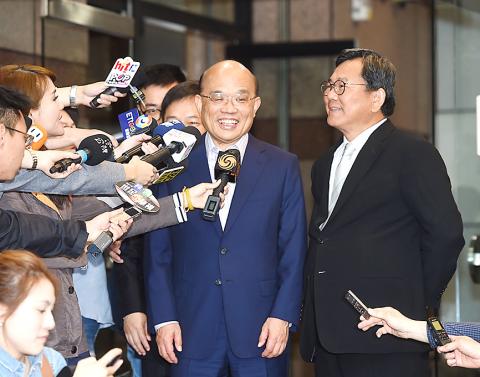Former premier Su Tseng-chang (蘇貞昌) yesterday agreed to represent the Democratic Progressive Party (DPP) in the New Taipei City mayoral election, although the paperwork formalizing his candidacy would not be completed until the end of this month.
President Tsai Ing-wen (蔡英文), who is also DPP chairperson, yesterday met with Su after the party’s Central Executive Committee and its Electoral Strategy Committee on Wednesday recommended that Su be drafted as the party’s candidate for New Taipei City mayor, DPP spokesman Cheng Yun-peng (鄭運鵬) said.
The mayoral election is a linchpin of the party’s electoral strategy for the November nine-in-one elections that would be an overall morale booster if successful, Cheng quoted Tsai as saying at the meeting.

Photo: Fang Pin-chao, Taipei Times
Su’s political credentials and past connections to New Taipei City make him the party’s best candidate, and his performance as Taipei County commissioner from 1997 to 2004 created the DPP’s standard for quality governance, Cheng quoted Tsai as saying.
Cheng said that Su — who has demonstrated a willingness to support the party’s younger members and had stumped for DPP Legislator Wu Ping-jui (吳秉叡), who on Saturday last week bowed out of the DPP primary for New Taipei City — cited a sense of duty for accepting the party’s nomination.
The spokesman quoted Su as saying that his decision would bring about controversy, but “as a founding member of the party, I cannot say no when it needs me,” adding that the DPP would be needed at the helm to make New Taipei City successful.
After the meeting, Su said in a statement on Facebook that he would not let New Taipei City residents down and could help the city’s development.
Regarding a promise in 2010 not to run for a third term as commissioner of Taipei County — which later became New Taipei City — Su said he could not predict the future.
Electoral Strategy Committee convener Lin Hsi-yao (林錫耀) said that the formal procedures for Su’s nomination would be completed by April 25.
New Taipei City Council DPP caucus convener Lee Kun-cheng (李坤城) said Su’s decision was welcomed by all the party’s members in the city council.
With only seven months until the election, the party must stand united, especially when facing the Chinese Nationalist Party (KMT), which would have “home-field advantage” due to New Taipei City Mayor Eric Chu (朱立倫), Lee said.
The caucus would work closely with Su to achieve a majority in the city council, he added.
Separately, former premier Yu Shyi-kun (游錫堃), who represented the DPP in the 2014 New Taipei City mayoral race, said on Facebook that he fully supported the party’s decision to draft Su as its candidate.
The year-end local elections are critical for the party, which should unite as never before, Yu said.
Additional reporting by Ho Yu-hua

INVESTIGATION: The case is the latest instance of a DPP figure being implicated in an espionage network accused of allegedly leaking information to Chinese intelligence Democratic Progressive Party (DPP) member Ho Jen-chieh (何仁傑) was detained and held incommunicado yesterday on suspicion of spying for China during his tenure as assistant to then-minister of foreign affairs Joseph Wu (吳釗燮). The Taipei District Prosecutors’ Office said Ho was implicated during its investigation into alleged spying activities by former Presidential Office consultant Wu Shang-yu (吳尚雨). Prosecutors said there is reason to believe Ho breached the National Security Act (國家安全法) by leaking classified Ministry of Foreign Affairs information to Chinese intelligence. Following interrogation, prosecutors petitioned the Taipei District Court to detain Ho, citing concerns over potential collusion or tampering of evidence. The

NEGOTIATIONS: Taiwan has good relations with Washington and the outlook for the negotiations looks promising, Minister of Economic Affairs J.W. Kuo said Taiwan’s GDP growth this year is expected to decrease by 0.43 to 1.61 percentage points due to the effects of US tariffs, National Development Council (NDC) Minister Paul Liu (劉鏡清) said at a meeting of the legislature’s Economics Committee in Taipei yesterday, citing a preliminary estimate by a private research institution. Taiwan’s economy would be significantly affected by the 32 percent “reciprocal” tariffs slapped by the US, which took effect yesterday, Liu said, adding that GDP growth could fall below 3 percent and potentially even dip below 2 percent to 1.53 percent this year. The council has commissioned another institution

NEGOTIATIONS: The US response to the countermeasures and plans Taiwan presented has been positive, including boosting procurement and investment, the president said Taiwan is included in the first group for trade negotiations with the US, President William Lai (賴清德) said yesterday, as he seeks to shield Taiwanese exporters from a 32 percent tariff. In Washington, US Trade Representative Jamieson Greer said in an interview on Fox News on Thursday that he would speak to his Taiwanese and Israeli counterparts yesterday about tariffs after holding a long discussion with the Vietnamese earlier. US President Donald Trump on Wednesday postponed punishing levies on multiple trade partners, including Taiwan, for three months after trillions of US dollars were wiped off global markets. He has maintained a 10 percent

TRADE: The premier pledged safeguards on ‘Made in Taiwan’ labeling, anti-dumping measures and stricter export controls to strengthen its position in trade talks Products labeled “made in Taiwan” must be genuinely made in Taiwan, Premier Cho Jung-tai (卓榮泰) said yesterday, vowing to enforce strict safeguards against “origin laundering” and initiate anti-dumping investigations to prevent China dumping its products in Taiwan. Cho made the remarks in a discussion session with representatives from industries in Kaohsiung. In response to the US government’s recent announcement of “reciprocal” tariffs on its trading partners, President William Lai (賴清德) and Cho last week began a series of consultations with industry leaders nationwide to gather feedback and address concerns. Taiwanese and US officials held a videoconference on Friday evening to discuss the